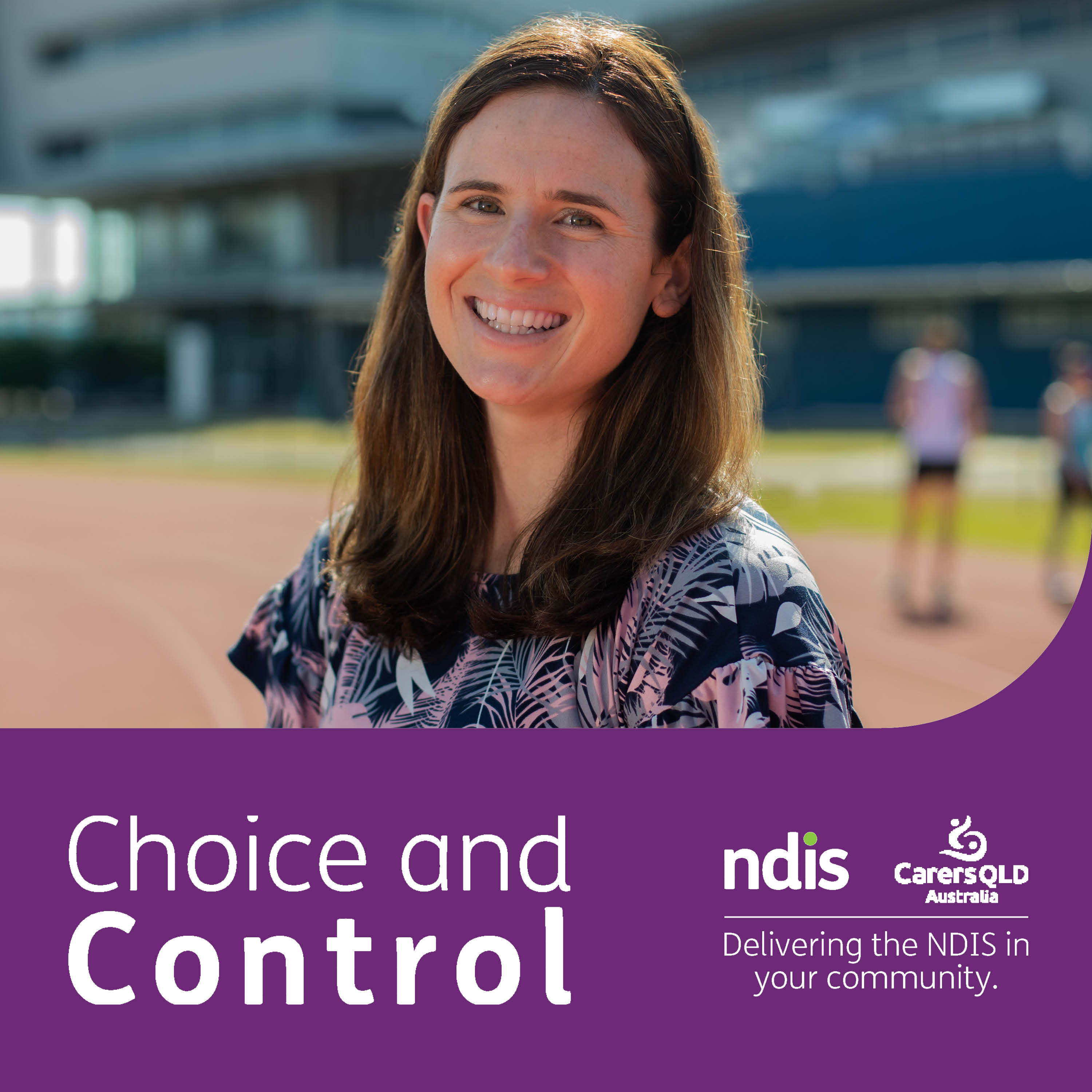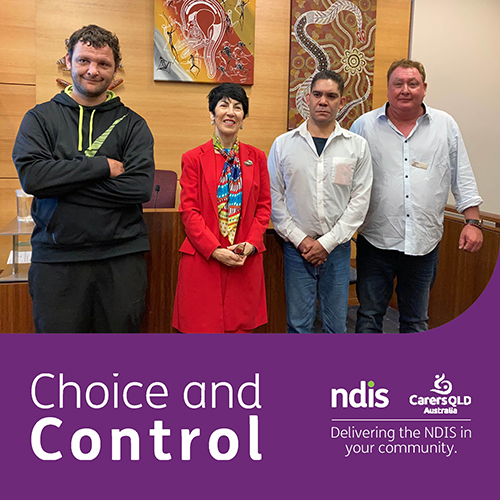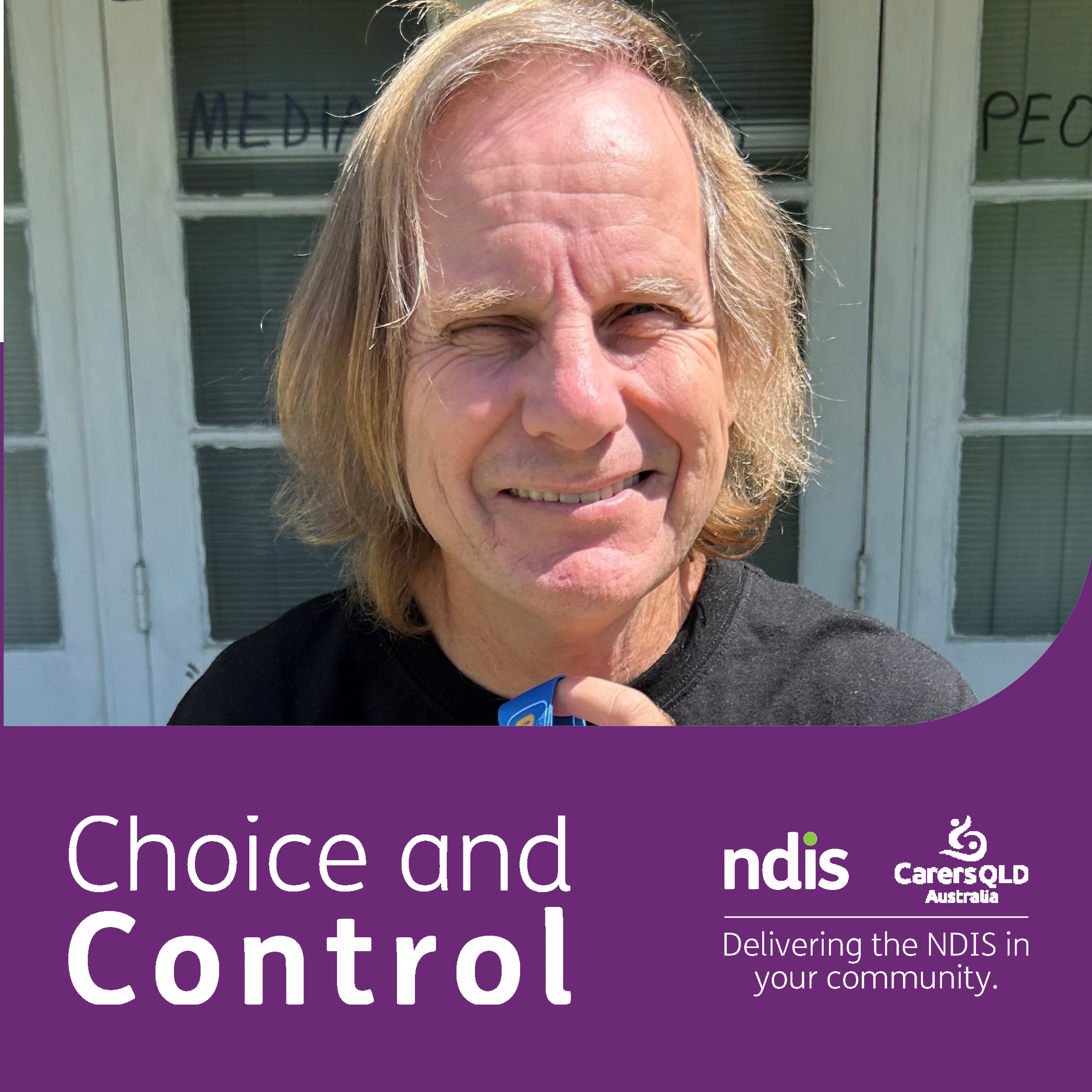Speaker 0 00:00:00 This episode contains themes. Some listeners may find distressing, including discussion of suicide self-harm and mistreatment of people with mental illness. If you need support, you can contact the mental health access line on one, 306 four two two double five. This is a confidential 24 seven line, and we'll link you to your nearest Queensland public mental health service. You can also contact lifeline telephone counseling on 13, 11, 14 in an emergency. Or if you feel unsafe, dial triple zero
Speaker 1 00:00:37 Choice and control a podcast, celebrating people with disability in this season, we're talking about access inclusion and the national disability insurance game. This podcast series is brought to you by carers Queensland and dis local area coordination partner in the community.
Speaker 0 00:00:55 I'm Jody van dewatering. Today, I'm talking to Suzanne dang, a Brisbane blogger, sharing her adventures in fashion and her experience living with mental illness. Suzanne's living independently, working as a mental health peer support worker and proactively managing her health and recovery with support from the national disability insurance scheme.
Speaker 2 00:01:16 My first attempt at suicide was when I was 14 and I didn't seek help until I was 19 or so I'll do that time. I was really stressed about school. I had problems with my self image, my self esteem, and I didn't seek help until much later. But when I went to the GP, I showed them that I was doing suicidal. I had a plan in place and I, I didn't want, I wasn't successful. And, um, over the years I've been in and out hospital and the mental health ward in a hospital, the hospital, as well as 19 and back, I remember I couldn't eat. I was on ITR, involuntary treatment order. I was on suicide watch for a whole month. I was on constant. And basically that means that with following me around dining room, because I was on suicide watch for a long time, I spent three months in hospital in the mental health ward and the Constance was lifted off me off the two months.
Speaker 2 00:02:18 Yeah, I was diagnosed with clinical depression, but over the years I've been misdiagnosed. It's like, it's a green area and, and so on. But my most recent diagnosis will be bipolar a couple years ago. I sometimes that he avoids this unwell. I feel suicidal. And I was also referred to mental health. We'd have a patient site at school at CCU and keep routes. And that was one of my best and what time of my life almost to use my voices and how to control them. And I also learned how to cook and then pass the budget. How to take care of myself. Was it affirmations every day? Or if it's other people, I like clients that the residents, I mean, we have plays and it was really interesting. Um, how, um, progressing my journey in recovery. And I felt that, um, I've got a lot of support, especially during this time or being in rehab. I left school at my life and at the moment, um, the mobile intensive rehab patient team and, um, all medications I take is being managed by the GP. That's a really good thing for me and I'm still getting my work and I have family and friends who understanding as well. And yeah,
Speaker 0 00:03:43 Those misdiagnoses, was it frustrating thinking? I'm not sure this is
Speaker 2 00:03:48 Absolutely. I didn't resonate with me at all. And I find it really difficult to understand the particular diagnosis and I find it really hard to get the right type of medication that I needed at the time. It was really frustrating, but I want to say that at the moment, my medication it's the best combination I've ever had since it was a long time. And it's really good. Yeah, Definitely. I'm working now working mental health. I teach mainly adults with severe and complex mental health issues and I find it really rewarding hours to get to work. I love the job and it gives me a sense of purpose as well, to get out of bed each day, because I want to give back to the community
Speaker 0 00:04:41 And how wonderful that you can help people who are maybe going through some of the same things you were.
Speaker 2 00:04:46 Yeah, absolutely. Yeah. I think my story that was put into the position of being hot and all vulnerable and I'm, well, I think my purpose is to live through that experience and share it with others so that they can overcome their own issues as well
Speaker 0 00:05:05 For you in terms of your recovery and managing your condition.
Speaker 2 00:05:09 I definitely have a safety plan. Like what's my warning sign. My trick is like, like hooking really fast or feeling suicidal and having a plan. I have a separate plan that helps me printed out as well. I also see a lot of self-care almost every day before and after work, because they say that you can't take care of yourself. And I really believe in that. And I exercise twice a week and I do a lot of art. I've had my art exhibited in exhibitions, which I'm really proud of and also have a good support network. I have a few best friends and in terms of my recovery and maintain my health, I also enjoy eating healthy food and, um, people and doing some public speaking like I'm doing now. And just giving back as a way to help me feel better about ourselves, that I have a sense of purpose in life as well.
Speaker 0 00:06:14 Background is Vietnamese. How is mental illness and those kinds of challenges treated in the Vietnamese coming?
Speaker 2 00:06:22 I think that's a really interesting question. If you look in past the Vietnamese people who have mental illnesses in Vietnam to pass the ones in Australia, definitely have no mental health system. My grandpa told me that people in the countryside and did not, if they to have a mental illness, they get chained to the bed. And it's really scary because I'm also in opinions that are maybe three, four or five years. Um, my family, um, forced me to see a fortune teller and the fortune teller said that I was upset and I found it really disheartening and really not appropriate. Yeah. And people in the business community generally think that mental illness, which is really a lot bigger, a big stigma. So then community, I think it's getting a bit better. Like it's, there's a mental health system in, in Australia and we need to do what we can like make and seek help and get the help that they need. But they're still in Vietnam. There's no mental system, as I said. Um, and it's really, it's really bad.
Speaker 0 00:07:24 It's more difficult then you're not only dealing with your own stigma around mental health and the challenges of reaching out for help. But you've also got all this cultural stigma and background to work with as well.
Speaker 2 00:07:37 Yeah, absolutely. It's stigma. I would say. Yeah, it's getting a bit better, but it's just still stigma. I finally understand why I'm still taking medications and see that I'm doing really well. That's how I explain to them that I am doing well because I am taking the medication and it's very hot. And I haven't been through that kind of thing before of taking medications. I know that Nvidia is community here in Australia, like taking medication is a sign of weakness, but it's a sign of strength
Speaker 0 00:08:11 Influenced your recovery. And also the way you understand your illness, particularly around hearing voices,
Speaker 2 00:08:17 Hearing the voice, it is, uh, it can be a frightening and scary experience for me. Long time ago. I thought God told me to die, but I realized that that it was not God, it was something else. It was the voice that was in my head. And it was very, um, very traumatizing for me to experience that. And I remember telling one of the, um, spiritual leaders and she took it the really long way. She, I felt she didn't understand. She said that I wasn't praying hard enough that I wasn't believing leading high enough. And, um, I felt earliest like stigmatized from her saying that, yeah, but I'm an unbeliever. God has a plan for me. I believe that he put me in a place of hurt and pain. So then I can help other people through my experiences. And I think God is a good guy.
Speaker 2 00:09:14 He wouldn't say anything that's bad to me. Yeah. If it's bad, it's actually my parents, my I'm hearing voices and I'm need to seek professional mental health. If I'm hearing this, what's, wasn't telling me to do something bad to myself. I won't go into detail. And, um, uh, and I have a second to hospital, different reasons, the reasons, and it's, it's helped me understand my illness in a way that, um, to help me differentiate, which is a good book. And my medication helps me with my, um, hearing. Was it too. And if I get here to tell me to end my life, that's when I know I need to reach out for help and perhaps get hospitalized
Speaker 0 00:09:57 And these dioceses, and you're using the indice, how's that going for?
Speaker 2 00:10:01 It's my second year of having a package. And just through my MBA, I had a review session yesterday went really well. So I'll be having an in-depth, I guess when it's painful month, in terms of the India support, it's been amazing, Jody. Um, I, I went to art classes and it gave me opportunities to broaden my horizons into my posts. And they helped me, um, with my driving lessons I had when I was younger, like 20, 23 I'm 29 now. And they, um, that helped me and it's made a big, positive impact in my life because I'm driving now halfway to West half-white by train also. And my coworkers come here and help me with my home and to help me with my support with like organization scheduling and cooking. Sometimes I'm really glad that the first time I tried and I see, um, muscle work once, twice a week. And, um, and yeah, really didn't really, really good to me, but I was lucky I met the right people. I have the right what coordinator as about support workers. I have a good plan manager who manages my finances.
Speaker 0 00:11:21 One of your other roles, as well as being a mental health advocate, as well as the work you're doing with other people with mental health challenges, you are also quite heavily into fashion. Could you just talk us through what interests you about fashion?
Speaker 2 00:11:34 Absolutely. In fact, um, I started my blog in 2013 and I didn't find mental health and combine it with passion and passion until I was dressing up. I would say, I love dressing up bold colors, statement, earrings late. I love posts. Yeah. And when I go to fashion events, I introduce myself as a fashion blogger. I just a little one minute pitch kind of thing. I say, Oh, I'm a mess. I have bipolar. I want to share my story in my newsletter, social media platforms as a voice, my voice to help other people who's going through similar things. And yeah, it took me a couple of years to like to say that comfortably. And I'm nervous that when I've been gone for two semesters here, I say the same thing and I hope that it inspires other people and it can help people. In other ways, when I take out my upside, I'll take out my Instagram on Facebook and I've been going to fashion events since 2013, seven years.
Speaker 2 00:12:34 And I'm, I'm quite surprised I'm not sick of it yet, but, um, I still love it a lot. Yeah. I, I love going to events and meeting people and I especially love going by myself. Cause I think throwing myself, it pushes you, you go with your friends, you're confined to that group and you have to get to have the opportunity to talk to everyone. So I absolutely love being by myself and sharing my story in a way in a vulnerable way, um, that, um, I think that I can make a difference in people's lives and yeah, it was a little fashion events coming up this month will be quite busy as well
Speaker 0 00:13:12 Is representation that in the fashion world, we see people with different abilities, different backgrounds that it reflects the diversity of this great big community.
Speaker 2 00:13:23 Yeah, absolutely. I think that's a really good question. I instance that I did the news pageant and that was quite quite the largest girl. I had both taken of me in lingerie, in formal wear and in bikini and so on. I was sad, 14, 14. I didn't care at a time like the biggest gap. I didn't care because I want to make a difference, like become a role model that anyone who has any size body can ask the ends, the pageants. But as soon after the, the public, I've got some negative comments. Some people say, Oh, you're fat or skinny enough, what kind of thing. Yeah. And that makes me really curious on how people hasn't really, really centered, especially in the eighties. And it just doesn't make sense to me, but I noticed that for fact, I entered the pageant once a win, but mainly, but I want to be a creative, be a positive role model for those who wants to check into Mali and this just really important.
Speaker 2 00:14:27 I think it's, yeah. I try to see if you have a diversity of models, Muslims getting better. And I think it's so important because we people with disabilities, we add this also human. We, we have our own experiences as well. And I believe that people can, can model no matter what size body they are or how not to do what they want. And, um, yeah, my experience with the pageants, like, well, I try to reapply again. I remember, um, when you say offset, we ha we only allow eight girls and this is a big, I'm just me. I'm the, okay. Yeah. And I was like, yeah, yeah. And she, yeah, she said that, yeah, it kinda had like issues on the pageant. And so I want to be involved almost go to modeling, but if that's an event or how to share a story in a vulnerable way, that helps people. Yeah.
Speaker 0 00:15:40 You can follow Suzanne's adventures in fashion and mental health on her blog at Suzanne hyphen, dang.com. That's <inaudible> hyphen D I N g.com. You can also look for Suzanne dang on Instagram, Facebook, and Twitter.
Speaker 1 00:15:57 Thanks for joining us at choice and control a carers Queensland podcast. For more information about carers Queensland, the national disability insurance scheme, or the local area coordination program, please contact us
[email protected]. Or you can catch up with us on Facebook search for carers Queensland and dis. This podcast is a place for people with disability to share experiences, stories, and achievements. If you have a story you think we should know about, please contact us through the carers Queensland acquirees line at one 300 triple nine, six, three, six, or email CQ dot
[email protected] until next time. Thanks for listening.
Speaker 0 00:16:49 If you need support, you can contact the mental health access lawn on one, 306 four two two double five. This is a confidential 24 seven line, and we'll link you to your nearest Queensland public mental health service. You can also contact Laughlin telephone counseling on 13, 11, 14 in an emergency, or if you feel unsafe, dial triple zero.


